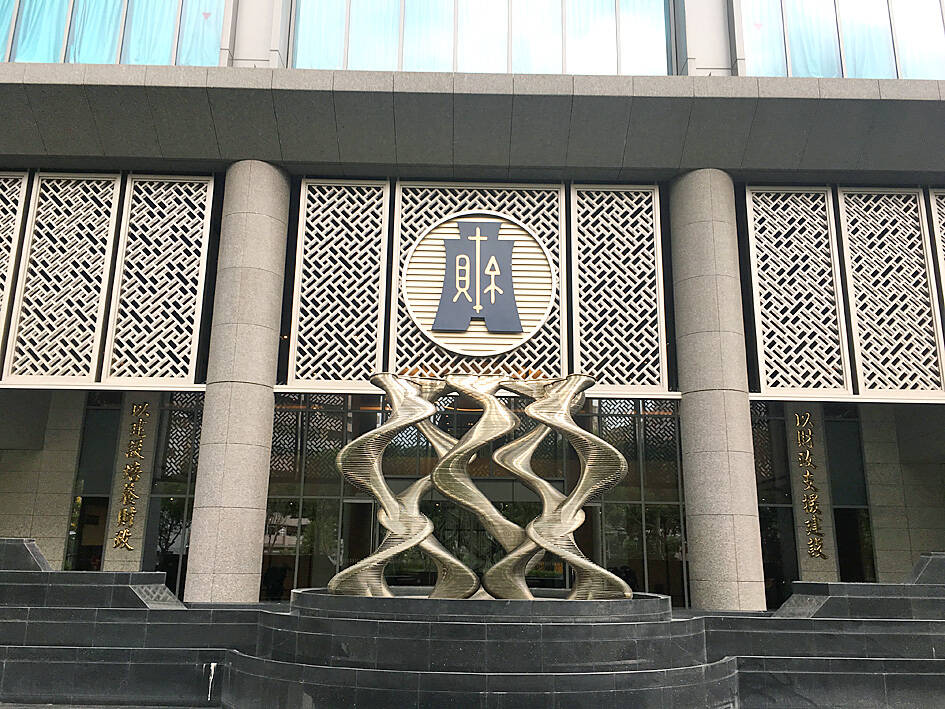Tax revenue last year increased 7.9 percent from a year earlier to NT$3.73 trillion (US$112.62 billion), exceeding the government’s budget target by NT$497.2 billion, aided by hefty gains in securities transaction, personal income and business tax revenues, the Ministry of Finance said yesterday.
The real surplus could reach NT$510 billion if late payments are added in, ministry statistician Liu Shun-rong (劉訓蓉) told an online media briefing, adding that it is the fourth consecutive year that revenues exceeded the official target.
Revenue from securities transaction taxes amounted to NT$288 billion, spiking 46 percent from one year earlier, as average daily turnover swelled 42.6 percent to NT$477.4 billion, Liu said.

Photo: Clare Cheng, Taipei Times
“The sharp rise came from fund flows to the local bourse to take advantage of the artificial intelligence-stock fever,” Liu said.
The TAIEX rallied 28.47 percent last year, second only to the US’ tech-heavy NASDAQ’s 29.81 percent gain, she said.
Corporate income tax revenue grew 3.6 percent to NT$1.12 trillion even though non-tech firms took a hard hit from a lingering global economic slowdown and overproduction from Chinese peers, Liu said, attributing the small increase to a relatively low base in 2023 due to profit declines and temporary tax relief measures.
Revenue from personal income tax expanded 8.9 percent to NT$822.2 billion, aided by higher cash dividends and capital gains from property transfers, she said.
The first half of last year saw a bullish housing market, propelled by favorable lending terms for first-home purchases. The trend boosted housing loans near a record-high in August, prompting the central bank to expand credit controls in September to pre-empt what it called a repeat of the housing bubble bust seen in the US in 2008.
Revenue from land value increase tax upon resale of real-
estate properties gained 5.3 percent to NT$99 billion, the ministry reported.
Business tax revenue expanded 6.4 percent to NT$608.9 billion, as domestic banks benefitted from interest rate hikes, while local suppliers of electronic components reaped a windfall from active investment in artificial intelligence by US cloud service providers, it said.
Additionally, revenue from entertainment tax grew more than two-fold, as Taiwanese packed major music concerts and sports events, Liu said.

Intel Corp chief executive officer Lip-Bu Tan (陳立武) is expected to meet with Taiwanese suppliers next month in conjunction with the opening of the Computex Taipei trade show, supply chain sources said on Monday. The visit, the first for Tan to Taiwan since assuming his new post last month, would be aimed at enhancing Intel’s ties with suppliers in Taiwan as he attempts to help turn around the struggling US chipmaker, the sources said. Tan is to hold a banquet to celebrate Intel’s 40-year presence in Taiwan before Computex opens on May 20 and invite dozens of Taiwanese suppliers to exchange views

Application-specific integrated circuit designer Faraday Technology Corp (智原) yesterday said that although revenue this quarter would decline 30 percent from last quarter, it retained its full-year forecast of revenue growth of 100 percent. The company attributed the quarterly drop to a slowdown in customers’ production of chips using Faraday’s advanced packaging technology. The company is still confident about its revenue growth this year, given its strong “design-win” — or the projects it won to help customers design their chips, Faraday president Steve Wang (王國雍) told an online earnings conference. “The design-win this year is better than we expected. We believe we will win

Chizuko Kimura has become the first female sushi chef in the world to win a Michelin star, fulfilling a promise she made to her dying husband to continue his legacy. The 54-year-old Japanese chef regained the Michelin star her late husband, Shunei Kimura, won three years ago for their Sushi Shunei restaurant in Paris. For Shunei Kimura, the star was a dream come true. However, the joy was short-lived. He died from cancer just three months later in June 2022. He was 65. The following year, the restaurant in the heart of Montmartre lost its star rating. Chizuko Kimura insisted that the new star is still down

While China’s leaders use their economic and political might to fight US President Donald Trump’s trade war “to the end,” its army of social media soldiers are embarking on a more humorous campaign online. Trump’s tariff blitz has seen Washington and Beijing impose eye-watering duties on imports from the other, fanning a standoff between the economic superpowers that has sparked global recession fears and sent markets into a tailspin. Trump says his policy is a response to years of being “ripped off” by other countries and aims to bring manufacturing to the US, forcing companies to employ US workers. However, China’s online warriors